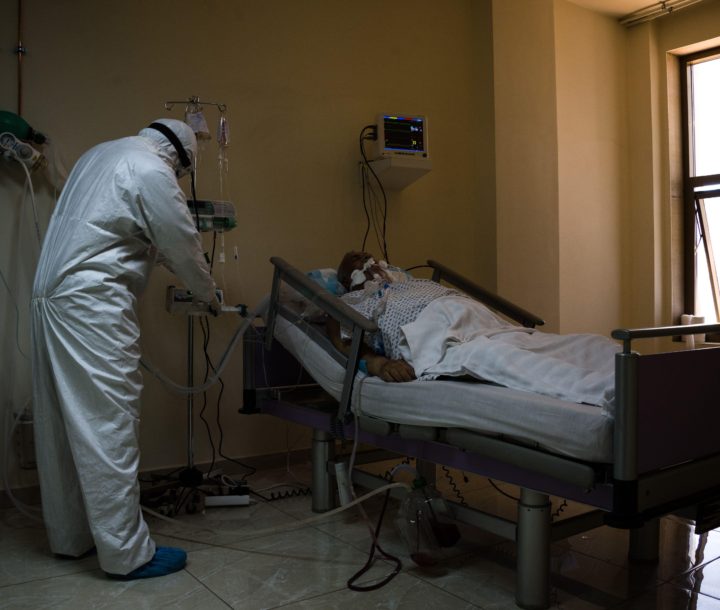Before the COVID-19 pandemic, palliative care was slowly gaining recognition as an important part of the healthcare continuum alongside life-saving treatment in humanitarian crises. The priority of palliative care in pandemic response has been thrust into the spotlight in countries slammed with high numbers of people suffering severe symptoms and dying, such as Italy, the US and the UK.
For countries already gripped with war or disaster, COVID-19 has the potential to magnify existing physical and psychological suffering. Severe illness and deaths are inevitable, with rates swiftly dwarfing those in well-resourced countries. COVID-19 will rapidly engulf health systems in humanitarian settings and may cause some to collapse altogether.
Large numbers of patients with COVID-19 will experience dreadful respiratory symptoms without relief. Many will die segregated from loved ones, or at worst, abandoned without any human presence at all.
“There is no piped oxygen, electrical power cuts are common, and the health workforce capacity is unlikely to be enough to deal with even a small number of COVID-19 cases, never mind the potential of thousands of deaths from this disease,” surgeon and humanitarian David Nott wrote in the Lancet in May. “There is now an urgent need to strengthen the COVID-19 response for the most vulnerable populations in places affected by conflict and humanitarian crises.” But this response must include caring for the dying.
Hugo Slim recently reflected, “Humanitarian response must stay with the dying while it saves the living”. The shared ethos of palliative care and humanitarian action to help everyone suffering the effects of conflict, disaster or disease, and to treasure human relationships and spirit through caring, compassion, presence and witness, should make the integration of palliative care into COVID-19 response self-evident. Some of the central aims of palliative care have featured throughout the history of humanitarian response. The formal humanitarian system owes credit to Henry Dunant’s account of the Battle of Solferino in 1859, when Dunant, stumbling across the battlefield as a travelling businessman, tried to relieve the suffering of wounded and dying soldiers through compassionate care and presence. Why then, in this COVID-19 environment, are humanitarian agencies continuing to ignore palliative care?
The editorial ‘Palliative care ought to be an explicit part of national and international response plans for COVID-19’ was published in the Lancet in early April, drawing attention to the World Health Organisation’s oversight for failing to include palliative care in COVID-19: Operational guidance for maintaining essential health services during an outbreak. The UN Office for the Coordination of Humanitarian Affairs has released the humanitarian sector’s overall Global COVID-19 Response Plan. Palliative care is not included in its strategic priorities alongside other health mitigation and response measures—another serious omission.
Humanitarian organisations must deliberately include palliative care in country-specific COVID-19 plans. Increasing health resources should not be limited to the supply of Personal Protective Equipment or life-saving measures such as ventilators or intensive care beds; it must also include the medicines and staff necessary to care for patients at the end-of-life.
Humanitarian actors should plan for creative ways to preserve human connection between seriously ill or dying patients and families. Response plans should harness the power of communities and volunteer networks to provide comfort and presence to those who are suffering or dying and to provide vital support to families left behind. And all of these measures should be provided not only for those patients with COVID-19, but for those already enduring chronic or terminal disease.
In this pandemic, where grief and death may devastate communities already in crisis, the humanitarian sector has an opportunity to take leadership on prioritising palliative care and truly fulfil its mandate to alleviate suffering wherever it may be found.
Humanitarian workers and organisations are skilled in the art of attending to community needs, in the act of bearing witness, and in understanding our common humanity amidst dire and heartbreaking circumstances. Extending these qualities to those who are dying will ensure that humanitarian agencies don’t just save people, but compassionately serve people. The opportunity has never been clearer, nor more essential, to provide leadership in the art of caring in dying and death. When COVID-19 has abated and humanitarian agencies begin to evaluate their efforts, their credibility and relevance can only be boosted through such a service.


